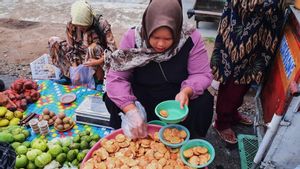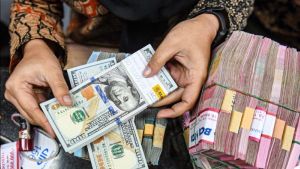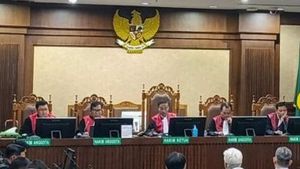JAKARTA - Pagebluk COVID-19 demands the world to a new order. New normal or new normal, people call it. This demands a revolution in many sectors of life, including education in universities. Teaching and learning are now being done online. There are no class meetings, let alone intellectual discussions in the halls of the campus. The question is, when will the pay go down, considering that campus facilities are no longer used by students.
Recently, the virtual universe has been enlivened by the hashtag #MendikbudDicariMahasiswa. This movement became a picture of student unrest. They demanded the Minister of Education and Culture (Mendikbud) Nadiem Makarim to immediately take steps to reduce the single tuition fee (UKT) during the COVID-19 period.
This is a global problem. Students and parents around the world are troubled by the same anxiety. They are frustrated by the pagebluk style of teaching and learning, which they call substandard educational instruction. Many classes were canceled. Students can no longer take advantage of campus facilities such as laboratories and libraries.
At New York University, for example. On campus, the tuition fee is claimed to reach US $ 53,308 for the 2019-2020 period. Reported by US News, students said they could not get what they had paid for. They said there were no refunds for paid classes. They are frustrated by the class conducted through Zoom and the unclear schedule. Educational support elements such as trials, art projects or clinical experience are not available.

Put simply, "Zoom University is not worth 50,000 dollars a year," a student wrote in a petition calling for New York University to partially refund tuition. Another student argued, "I don't pay tuition to attend classes at Zoom."
In England too. The government enforces a similar regulation. UK University students still have to pay tuition fees in full, even though some classes are conducted online. "We do not believe that students are entitled to reimbursement (education funds) if the quality (teaching and learning process) is still there," said British Higher Education Minister Michelle Donelan.
Donelan also said no official decision had been taken in the following academic year. However, if classes are held online and "students are really getting quality and they are getting the instruction that is fit for purpose", they will not get a fee discount.
In early May, students in South Korea (South Korea) also demanded a refund of their tuition fees because many classes are held online during the morning. A petition to the Constitutional Court is rolled out. They demanded that the Court establish a legal basis for reducing tuition fees in times of crisis. The move was taken after the Ministry of Education and the university threw at each other over who was responsible for the refunds of thousands of students.
The government argues there is no legal basis for stipulating country-wide cost reductions due to the cancellation of face-to-face classes. South Korean Deputy Education Minister Park Baeg-beom said in early April that refunding tuition fees was "a matter for university leaders to decide".
How about in Indonesia?We must say, there is no meaningful information in Indonesia. Nadiem, until now has not given any answers regarding the demands of the students. However, education observer Darmaningtyas conveyed a number of encouragement that the government must do.
First, of course, it will free UKT for students in the upcoming odd semester. "What is in question is for sure who will enter the month of July or the odd semester. Because the lecture is also unclear, it is better to release it," he said, as written by Kompas.com, Tuesday, June 2.

According to Darmaningtyas, in principle, UKT is used to increase the operational costs of education on campus. Therefore, when the teaching and learning process is carried out from a distance, there is no reason for students, especially public universities, to pay. "Students mean they don't take advantage of campus facilities. The lecturers, if they are in the country, they have already been paid by the state," he explained.
Furthermore, Darmaningtyas said, campuses can use educational operational assistance (BOP) to finance technical matters on campus. Maintenance, electricity and cleanliness, for example. Moreover, state campuses. "There is no state campus that is not subsidized by the government. UKT is to optimize the learning process, because the government budget is limited," he explained.
Japan has a wayIn Japan, the application of the rules is different. The Japanese cabinet approved a program to provide up to 200 thousand yen or about 2 million rupiah in cash to each student in the country. The assistance is expected to be able to help students pay for their tuition fees. An interesting step, considering that Japan is one of the countries that has been hit financially by COVID-19.
The Japan Times reported that Japan previously set aside 53 billion yen as its first additional budget for the 2020 fiscal year for the program. Eligible for the cash admission program are graduate and undergraduate students at universities, students at junior colleges, engineering students, vocational students, as well as foreign students studying at Japanese language schools.
"It is very important for students not to continue and advance their education. We want to immediately provide assistance to everyone," said Japanese Education Minister Koichi Hagiuda.
Several universities in Japan also took the initiative to reduce the cost of education. Shibaura University, for example. They stated that they would reduce tuition fees for all students in the second semester of the school year by 60 thousand yen. It is hoped that the university will allocate this amount to the cost of supporting internet for online classes, which have started since April.
The English, Chinese, Japanese, Arabic, and French versions are automatically generated by the AI. So there may still be inaccuracies in translating, please always see Indonesian as our main language. (system supported by DigitalSiber.id)










